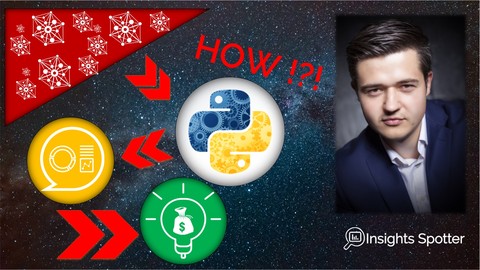
Python Beginners Guide To The Data Analysis Galaxy Volume 1
-
Python Beginners Guide To The Data Analysis -
Master all the basics of Python Programming for Data Analysis -
Develop problem solving ability -
Start Developing Data Analysis abilities with Python -
Learn to automate Data Analysis Task -
Understand What is Python, Anaconda, Jupyter Notebook -
Data Types & Structures -
If Statement, Functions and For Loops -
Arrays
- No
Exercise files are available in Introduction
So, why Python? Well, Python is great for beginners because it has a simple syntax. Therefore, you will be quick to write programmes, make meaningful analysis and start having some fun.
Python is also amazingly powerful and it’s used by some of the biggest companies like Google, Dropbox, Reddit and Instagram. One very important aspect of Python is a large community of users, who are willing to help. It is crazy, what obscure problems I was able to solve using their assistant. Plus, Python has a large collection of libraries and tools that allow you to pull in powerful functionality such as complex data analysis and visualizations into your programs with a single line of code.
Ok, you have decided to go with python. But how to be smart about learning it? Various courses teach you basics that apply to the development of apps. Yet, when you analyse data you may not need all that functionality. Say, take my personal experience, I frequently need to create a one-off project with insights for my management. I would need to take several sets of data, transform and clean it. Then I would prepare insights reports or visualisations. But that does not require creating an app with error handling or complicated UI.
Even though, you may use some of the other capabilities of Python in the future. Still, for data analysis, it could become a distraction. Ultimately, you will realise that there is so much functionality available for python that you just cannot learn everything. You will need to find a balance. If your goal is to analyse data you should go deeper in data specific libraries and not wider.
So, I have decided enough is enough, I need to help others, who want to learn data analysis with python and what to do it smartly. Thus, I have created “Python Beginners Guide To The Data Analysis Galaxy Volume 1” to expedite your learning and generate value faster. After you complete the course, you will be ready and equipped to handle more complicated libraries like pandas.
Why should you care about pandas, I hear you ask? Pandas is a genuine workhorse for data analysis. It allows you to analyse, transform, clean data and do much more in python. It is a fast, powerful, flexible and easy to use open-source data analysis and manipulation tool, built on top of the Python programming language.
If you want to be great at data analysis pandas is what you need. I have tried to include all the required basics in the course for you to be ready to handle pandas.
So, brew a nice cup of coffee, get some desserts and dig into “Python Beginners Guide To The Data Analysis Galaxy Volume 1”.
Enjoy and do not forget to have some fun!
- Business Analysts, who want to use Python for their day to day tasks and increase productivity.
- Project Managers, who want to use Python for their day to day tasks and increase productivity.
- Data Analysts, who want to use Python for their day to day tasks and increase productivity.
- Inviduals, who would like to learn Python






